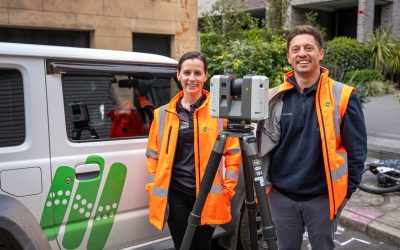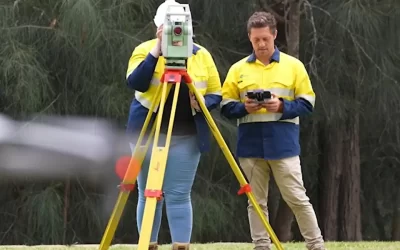In the dynamic landscape of urban development, the role of surveyors is pivotal, particularly in a thriving city like Brisbane. As infrastructure and road projects expand to meet the needs of a growing population, surveyors provide essential services that ensure these projects are executed efficiently and effectively. Their expertise is crucial in delivering accurate results for infrastructure and road projects, ensuring precise measurements and reliable data for successful outcomes. This article delves into the multifaceted contributions of Brisbane surveyors in infrastructure and road projects, highlighting their importance in planning, execution, and compliance, and emphasising that the team is determined to provide excellence in every aspect of surveying.
Introduction to Surveying Services
Surveying services form the backbone of the construction industry in South East Queensland, providing the accurate survey data essential for successful construction, civil, engineering, and mining projects. Wumara pride ourselves on delivering comprehensive surveying services tailored to the unique needs of each client. Whether it’s boundary surveys, detail surveys, or construction surveys, our experienced team ensures that every project receives the highest level of expertise and attention to detail.
With a deep understanding of town planning and land development, our land surveyors offer invaluable guidance throughout the development process. We leverage cutting-edge technology, including utility mapping and advanced surveying equipment, to deliver accurate and precise data that supports informed decision-making. Our professional approach and commitment to accuracy have established us as one of Brisbane’s leading surveying companies, trusted by clients to support their projects from concept to completion. By choosing our surveying services, clients can be confident of achieving the best outcome for their development, backed by a team dedicated to excellence in every aspect of surveying, planning, and mapping.
The Surveying Process
The surveying process is a carefully structured journey designed to meet the specific project requirements of each client. It begins with an initial consultation, where our experienced team works closely with clients to determine their goals and develop a customised survey plan that ensures the best outcome. Understanding the unique aspects of each site, we use advanced technology such as GPS and total stations to collect precise data on site features, boundaries, and other critical information.
Once data collection is complete, our skilled surveyors analyse and interpret the information to provide accurate and reliable survey results. Throughout the process, we maintain open and transparent communication, keeping clients informed and engaged at every stage. This collaborative approach ensures that the final survey data not only meets but exceeds expectations, supporting the successful delivery of each project. By combining technical expertise with a client-focused mindset, we deliver survey solutions that are both precise and tailored to the needs of every development.
Types of Surveys for Infrastructure Projects
Infrastructure projects require a variety of specialised surveys to ensure every aspect of construction is planned and executed correctly. Boundary surveys are fundamental for determining property boundaries, ensuring that construction projects are built within the correct limits and in compliance with legal requirements. Detail surveys provide comprehensive information about site features, including topography, vegetation, and existing infrastructure, which is crucial for effective planning and design.
Construction surveys play a pivotal role during the building phase, guiding the placement of structures and infrastructure to ensure they are constructed in the correct location and according to specifications. At Wumara, we offer a full range of surveying services to support infrastructure projects, including aerial mapping for large-scale site analysis, ongoing monitoring to track project progress, and site surveys to capture all relevant details. Our expertise in these diverse survey types ensures that every project is supported by accurate data and professional guidance, from initial planning through to completion.
The Role of Surveyors in Infrastructure Development
Surveyors are often the unsung heroes behind major infrastructure projects. Their expertise is crucial in the early stages of development, where accurate measurements and assessments lay the groundwork for successful execution.
Developers and builders rely on surveyors for precise data and survey solutions that support their projects from concept to completion, ensuring efficiency, compliance, and smooth project progression.
Site Analysis and Feasibility Studies
Before any construction can begin, a thorough site analysis is essential. Brisbane surveyors conduct detailed feasibility studies to evaluate the viability of proposed projects. This process involves assessing the topography, soil conditions, and existing infrastructure to determine the best approach for development.
By utilising advanced surveying technologies such as GPS and 3D laser scanning, surveyors can provide precise data that informs decision-making. These technologies enable surveyors to accurately locate important site features and boundaries, such as structures, utilities, and property lines, which is essential for conducting accurate feasibility studies. This information not only helps in identifying potential challenges but also aids in optimising design and construction strategies. Furthermore, the integration of Geographic Information Systems (GIS) allows surveyors to visualise data in a spatial context, enabling stakeholders to better understand the implications of their projects on the surrounding environment and community.
Land Surveying and Boundary Identification
Accurate land surveying is fundamental to any infrastructure project. Brisbane surveyors meticulously measure land boundaries to ensure that projects comply with legal requirements and zoning regulations. A boundary survey is essential for accurately identifying property lines, verifying land ownership, and supporting both legal and development requirements. This process is crucial in preventing disputes with neighbouring properties and ensuring that developments are built within the designated areas.
In addition to boundary identification, surveyors also play a vital role in establishing reference points that guide the construction process. These reference points are essential for maintaining alignment and elevation throughout the project, ensuring that the final structure meets design specifications. During boundary surveys, surveyors document features such as retaining walls to ensure clarity in legal boundary marking and compliance in site planning. Moreover, surveyors often collaborate with architects and engineers to ensure that the design is not only feasible but also sustainable. They assess environmental impact, taking into account factors such as drainage patterns and natural habitats, which can significantly influence the long-term success of infrastructure projects. Their insights help to create developments that are not only functional but also harmonious with the surrounding landscape, reflecting a commitment to responsible and thoughtful construction practices.
Surveyors in Road Construction Projects
Road construction is a complex endeavour that requires careful planning and execution. Our surveyors have extensive experience in civil construction projects, including roads, bridges, and other major infrastructure developments. Surveyors contribute significantly to this process, ensuring that roads are designed and built to meet safety and efficiency standards.
Design and Planning Support
During the design phase of road projects, surveyors collaborate with engineers and planners to create detailed layouts. Their expertise in topographical mapping enables them to identify the most suitable routes, taking into account factors such as existing infrastructure, environmental considerations, and community impact. Development surveys provide essential data for planning and designing road projects, supporting the subdivision, registration, and planning process for new land parcels involved in road development.
Moreover, surveyors provide critical input on drainage and grading, which are essential for road longevity and safety. By analysing the natural flow of water and the terrain, they help design roads that minimise erosion and flooding, ultimately leading to more durable infrastructure.
Construction Monitoring and Quality Assurance
Once construction begins, surveyors play an ongoing role in monitoring progress and ensuring quality. They conduct regular inspections to verify that work is being carried out according to the approved plans and specifications. This oversight is crucial in identifying any deviations from the design that could compromise safety or functionality.
Additionally, surveyors utilise technology such as drones and photogrammetry to capture real-time data on construction progress. This information allows project managers to make informed decisions and adjustments as necessary, ultimately leading to more efficient project delivery.
Compliance and Regulatory Requirements
In Brisbane, infrastructure and road projects must adhere to a myriad of regulations and standards. Surveyors are instrumental in ensuring compliance with these requirements, which is vital for the successful completion of any project. Local offices in Brisbane provide valuable regional expertise, helping surveyors navigate compliance requirements specific to the area.
Environmental Assessments
As environmental concerns continue to rise, surveyors are increasingly involved in conducting environmental assessments. These assessments evaluate the potential impact of construction on local ecosystems and biodiversity. By identifying sensitive areas and recommending mitigation strategies, surveyors help ensure that projects align with environmental regulations.
Surveyors also assist in obtaining the necessary permits and approvals from local authorities. Their expertise in navigating the regulatory landscape is invaluable in expediting the approval process, allowing projects to move forward without unnecessary delays.
Safety Standards and Risk Management
Safety is a paramount concern in any construction project. Surveyors in Brisbane contribute to risk management by identifying potential hazards and recommending safety measures. Their assessments help ensure that construction sites comply with safety standards, protecting workers and the public alike.
By conducting thorough site inspections and risk assessments, surveyors provide valuable insights that inform safety protocols. This proactive approach not only minimises accidents but also fosters a culture of safety within the construction industry.
Technological Advancements in Surveying
The surveying profession has evolved significantly with the advent of new technologies. Brisbane surveyors are at the forefront of these advancements, utilising cutting-edge tools to enhance their services. Having a qualified surveyor is essential to accurately interpret and apply these technological advancements, ensuring precise and reliable results.
3D Modelling and Visualisation
One of the most significant advancements in surveying is the use of 3D modelling and visualisation software. This technology allows surveyors to create detailed, three-dimensional representations of proposed projects, providing stakeholders with a clear understanding of the design and its implications.
These models facilitate better communication among project teams, enabling more effective collaboration and decision-making. Stakeholders can visualise the project in its entirety, leading to more informed discussions and fewer misunderstandings.
GIS and Data Analysis
Geographic Information Systems (GIS) have revolutionised the way surveyors analyse spatial data. By integrating various data sources, surveyors can create comprehensive maps that inform planning and decision-making processes.
GIS technology allows surveyors to analyse patterns and trends, helping identify potential issues before they arise. This proactive approach enhances project efficiency and reduces the risk of costly delays.
Benefits of Working with Registered Surveyors
Partnering with registered surveyors, such as those at Wumara, offers clients a host of advantages, starting with access to accurate and reliable survey data. Our registered surveyors bring a wealth of expertise and experience to every project, providing comprehensive surveying services that include boundary surveys, detail surveys, and construction surveys. We are committed to delivering precise data and exceptional customer service, ensuring that projects are completed efficiently and to the highest standards.
We adhere to strict standards of professionalism and integrity, giving clients peace of mind that their projects are in capable hands. Whether you are a home owner, builder, engineer, or project manager in Brisbane, the Gold Coast, or anywhere in South East Queensland, you can trust our team to meet your surveying needs with expertise and dedication. By choosing registered surveyors, clients can be confident that their projects will be completed to the required standards, with a focus on achieving the best possible outcome for every development.
Collaboration with Other Professionals
Surveyors do not operate in isolation; their work is closely intertwined with various other professionals in the construction and engineering sectors. Effective collaboration is essential for the success of infrastructure and road projects. Surveyors also work closely with engineers, town planners, and developers to manage the complexities, deadlines, and approval processes involved in subdivision projects, ensuring successful and compliant development outcomes.
Working with Engineers and Planners
Surveyors often collaborate with civil engineers and urban planners to ensure that projects are designed and executed according to best practices. This teamwork is crucial in addressing challenges that arise during the planning and construction phases. A detail survey provides comprehensive data—including contours, spot levels, ground details, and utility information—that supports effective project planning and execution.
By sharing insights and expertise, surveyors and engineers can develop innovative solutions that optimise project outcomes. This collaborative approach not only enhances the quality of the final product but also fosters a culture of continuous improvement within the industry.
Engaging with Local Communities
Community engagement is another critical aspect of infrastructure projects. Surveyors often play a role in liaising with local communities to address concerns and gather feedback. This engagement helps build trust and ensures that projects align with the needs and expectations of residents.
Surveyors also work closely with home owners to address concerns related to residential properties that may be affected by infrastructure projects, ensuring that the unique needs of residential areas are considered.
By involving the community in the planning process, surveyors can identify potential issues early on and work towards solutions that benefit all stakeholders. This collaborative approach ultimately leads to more successful and sustainable infrastructure projects.
Conclusion
Brisbane surveyors are integral to the success of infrastructure and road projects, providing essential services that span the entire project lifecycle. From initial site analysis and planning to ongoing monitoring and compliance, their expertise ensures that projects are executed efficiently, safely, and in accordance with regulations. Their detailed surveys also benefit individual house projects and residential developments by accurately locating the house and other structures, supporting design, renovation, and construction needs.
As the city continues to grow and evolve, the role of surveyors will remain crucial in shaping a sustainable and efficient urban environment. Their commitment to innovation and collaboration will undoubtedly contribute to the ongoing development of Brisbane’s infrastructure, paving the way for a brighter future.




